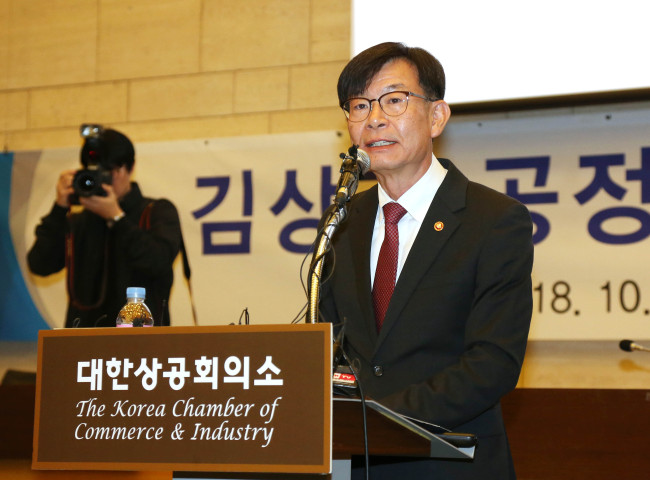FTC chief to reduce legal uncertainties, urge CEOs to make fair corporate environment
Predictable guidelines to be made for leniency amid growing concerns among companies
By Shin Ji-hyePublished : Oct. 22, 2018 - 15:23
The nation’s antitrust watchdog chief said Monday the agency will make efforts to reduce regulatory uncertainties while urging large companies to create a fair business environment.
Fair Trade Commission Chairman Kim Sang-jo spoke at the Korea Chamber of Commerce &Industry in Seoul before around 150 executives and employees from large and small companies, including Samsung, Hyundai Motor and LG, to explain the upcoming overhaul of the fair trade law and the revision of subcontract law that was enforced in July. The complete overhaul plan of the fair trade law had been previously announced in August. The revisions are to be submitted to the National Assembly next month.
The overhaul of the nation’s fair trade law is aimed to modernize the law that was first enacted in 1981, while the revision of the subcontract law is designed to prevent unfair business practices against small companies, according to the FTC.
Fair Trade Commission Chairman Kim Sang-jo spoke at the Korea Chamber of Commerce &Industry in Seoul before around 150 executives and employees from large and small companies, including Samsung, Hyundai Motor and LG, to explain the upcoming overhaul of the fair trade law and the revision of subcontract law that was enforced in July. The complete overhaul plan of the fair trade law had been previously announced in August. The revisions are to be submitted to the National Assembly next month.
The overhaul of the nation’s fair trade law is aimed to modernize the law that was first enacted in 1981, while the revision of the subcontract law is designed to prevent unfair business practices against small companies, according to the FTC.

The highlight of the transformation of the fair trade law is the abolition of the watchdog’s exclusive right to charge businesses. Upon the change, both prosecutors and the FTC would have the authority to charge companies over cartels, prompting concerns among companies over overlapping investigation and legal uncertainties.
“We will discuss with prosecutors about setting up certain standards over investigation (to remove the legal uncertainties),” Kim said.
For leniency -- a system that is regarded as a critical tool to uncover cartels, he said “The FTC will share it with a specific team in the prosecution and make specific guidelines to avoid redundancy.”
With regards to punishment related to unfair business practices, the revised fair trade law will abolish or minimize the scope for some practices. There have been calls from companies that excessive punishment increase burden companies over some cases, such as company mergers.
“In the 21st century, regulating conglomerates in advance may not be right. It seems to be changed to follow-up regulations,” he said.
He also talked about illegal intratrading deals within conglomerates, saying the antitrust authorities will present a road map for the practices.
“Intratrading itself is not illegal. But, we found many cases where contracts were unfairly awarded to some affiliates whose majority stakes were owned by ownership families,” the FTC chief said.
“For the predictability of companies, we will make legal rules to classify between internal transaction and unfairly awarding contracts,” Kim said.
As to the subcontract law that was enacted in July, Kim said the law will further restraint the companies from participating in public bidding and raise penalties when they unfairly reduce contract prices or leak technology documents of smaller companies.
“Many cases related to unfair subcontract practices take place due to the absence of written contracts,” Kim said, urging large companies to make written contracts and ask for technology documents in writing.
“Company CEOs should make corporate environment where the employees who violate such rules are punished. Otherwise, the unfair business practice between large and small companies will never be addressed,” Kim said.
By Shin Ji-hye(shinjh@heraldcorp.com)








![[Graphic News] More Koreans say they plan long-distance trips this year](http://res.heraldm.com/phpwas/restmb_idxmake.php?idx=644&simg=/content/image/2024/04/17/20240417050828_0.gif&u=)
![[KH Explains] Hyundai's full hybrid edge to pay off amid slow transition to pure EVs](http://res.heraldm.com/phpwas/restmb_idxmake.php?idx=644&simg=/content/image/2024/04/18/20240418050645_0.jpg&u=20240419100350)






![[From the Scene] Monks, Buddhists hail return of remains of Buddhas](http://res.heraldm.com/phpwas/restmb_idxmake.php?idx=652&simg=/content/image/2024/04/19/20240419050617_0.jpg&u=20240419175937)

![[KH Explains] Hyundai's full hybrid edge to pay off amid slow transition to pure EVs](http://res.heraldm.com/phpwas/restmb_idxmake.php?idx=652&simg=/content/image/2024/04/18/20240418050645_0.jpg&u=20240419100350)

![[Today’s K-pop] Illit drops debut single remix](http://res.heraldm.com/phpwas/restmb_idxmake.php?idx=642&simg=/content/image/2024/04/19/20240419050612_0.jpg&u=)